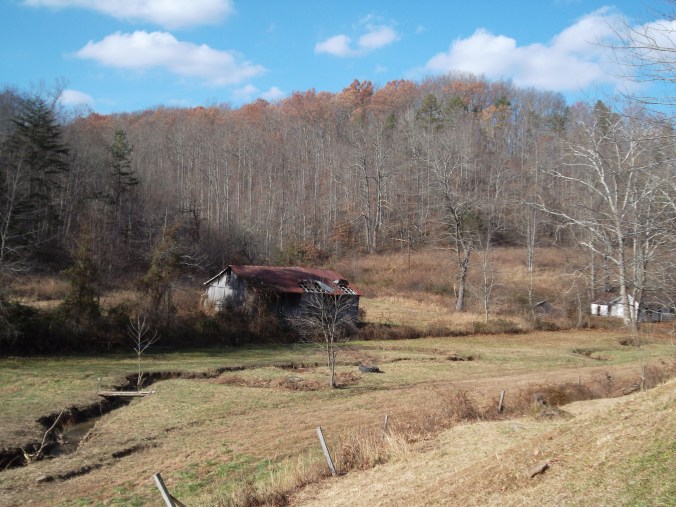Knock, knock.
I looked up from the cords I was unwinding from the vacuum, preparing to clean the front hall carpet that had been trampled down the day before by many pairs of muddy feet on their way to commodities—the food bank that we have at our office once a month. At the door was a very familiar face. It was Mary.
She laughed out loud in recognition as I pushed open the locked door. Mary has a very contagious laugh…the kind that you can’t help smiling when you hear it. “Well, hello Mary.” “Hello! I just got my mail, so I thought I would stop by to get my commodities. You know, I’ve really missed you girls.”
We had worked on Mary’s house in the late fall and early winter months. She was the kind of participant you don’t forget. Mary’s house is in a bad state—so bad, in fact, that CAP would like to build her a new house. Unfortunately, that hasn’t happened yet because they’re waiting for a grant to come through. But they were able to get a camper for her to live in during the interim. It’s not perfect, but it’ll keep her warmer than her house at least.
 I had heard about Mary before I ever made my way down her road to help set up her camper. She is one of my housemate Debbie’s participants in the elderly program, and Debbie had described her as just about as good-hearted as a human can get. My first reaction when I parked my truck at the top of the downward-sloping, muddy driveway that led its way down to the camper in the valley was, “Wow! This place is beautiful.” (I would love to see it in the spring and summer—the whole area, according to Debbie, is Mary’s garden).
I had heard about Mary before I ever made my way down her road to help set up her camper. She is one of my housemate Debbie’s participants in the elderly program, and Debbie had described her as just about as good-hearted as a human can get. My first reaction when I parked my truck at the top of the downward-sloping, muddy driveway that led its way down to the camper in the valley was, “Wow! This place is beautiful.” (I would love to see it in the spring and summer—the whole area, according to Debbie, is Mary’s garden).
As the days passed and we continued to serve at Mary’s, she continued to visit us. As we dug a trench for wires and water lines, as we measured and cut Wonderboard for the underpinning around the trailer, she was there. One day she came down with a Walkman radio. “I just love country music. I like to sing and dance to it when the school bus goes by. The neighbor kids think it’s funny. Do you like country?” One day the neighbor kids come for a visit. Whenever the school bus goes by, Mary always waves, and there are always multiple hands that wave back from the yellow-trimmed windows. On this day, there is a crackling amongst the bracken on the edge of the property after the school bus has left, and three kids come tumbling out: two boys and a girl. She introduces them to us. “This is Brooke. She likes to sing. She sings with me sometimes, don’t you Brooke?” Brooke smiles shyly. One of the boys, probably in his middle school years, grins at us mischievously and looks at our work in the mud. “Having fun?” Mary is there on the warmer days with a shovel and a rake in her hand, smoothing out the driveway, filling in the small trench that we dug for the electrical wires. “I don’t like being stuck in the house. I wish it was summer. Then I’d be out here all the time, in my garden.” She tells the story of when she worked in the tobacco fields with her husband, pulling their baby son behind her in a stroller as she progressed through the field.
She tells other stories—stories that make your heart ache. As we sit on old lawn furniture, eating our lunch in the pale November sun, she tells us the story of the day her husband died. “We were always together, even when one of us wasn’t doing so well,” she says. “Whenever I would come to work on the garden, he would come out with me, even when he wasn’t feeling well. It seems strange, him being gone. I always had more health problems than him. Right before he died, he tried to say something to me. I wish I knew what it was.”
And there was that day. The day when she was waiting by the truck door as soon as we arrived. The day that you could see the loneliness in her eyes. The day that she told us about the night that her son died. The day that we were sorry to leave her there alone, sitting on her front stoop. Mary loves people and there are old memories that creep up on her during these winter days when she lives alone.
Of course, she is not completely alone. Mary has a cat and two dogs that live on the hill. One’s name is Lady Bug. The other’s name is Fuzzy Britches. As they look down at us from the top of the hill and bark their disdain at our intrusion into their territory, she tells us the story of the day she saved Fuzzy Britches’ life. The first day that Mary can live in her camper, she goes in and sits down on the little camper-sized sofa. She smiles that beautiful Mary smile. “You know, I never thought that I would live in a place this nice! I can’t thank you all enough for what you do.” (No, Mary. We can’t thank you enough for what you do.) One day, she invites me inside her new temporary home and shows me her collection of novelty jack knives (I suppose I should say “pocket knives,” as “jack knife” is not a Kentucky term).
One of the things that she is most happy about in her new home is the built-in radio. She sits in a chair by the window as we work outside, and she turns the music up loud enough for us to hear. “George Jones!” She announces the singer as the music starts. As the music plays, we are at work building her a little landing outside of the door. We are struggling, as neither of us has ever done this before. Mary stops the music and comes out to see us. Amidst our frustration, amidst our feelings of what-in-the-dickens-are-we-doing-wrong, come Mary’s words: “Well, that looks really good, girls! See, I always say, girls can do anything the boys can. You two are just a regular pair of carpenters!”
No. It’s not every day that you get to meet a soul as beautiful as Mary’s. And that is why, as I stood in that hallway with my hand on a vacuum, I was able to say, quite wholeheartedly: “We missed you too, Mary.”
Elizabeth is a short-term volunteer serving in the Home Repair program and living in the Jackson County community. In the past, Elizabeth has also served with CAP as a long-term volunteer in the S.P.A.R.K. after school program and as a camp counselor at Camp Andrew Jackson. Opinions expressed in volunteer blogs are those of the authors and do not necessarily reflect the views of CAP or the Volunteer Program.Originally posted on the CAP Volunteer blog.








